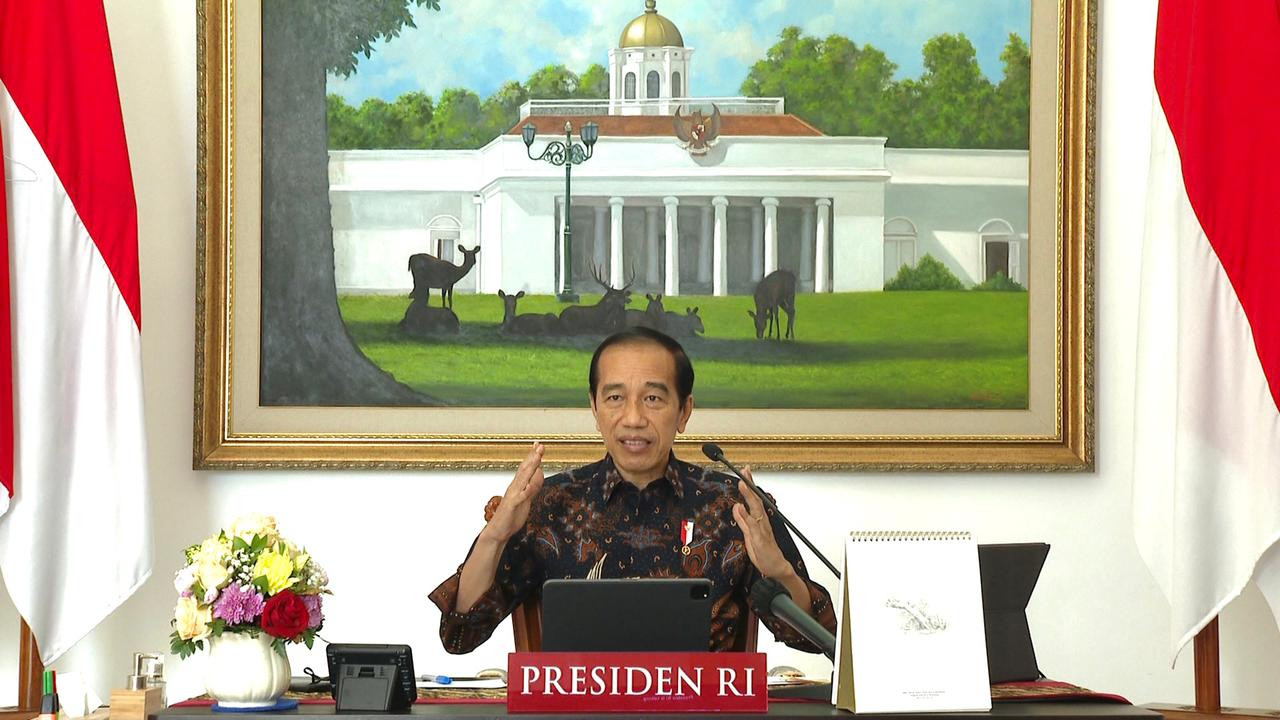Popular Reads
Top Results
Can't find what you're looking for?
View all search resultsPopular Reads
Top Results
Can't find what you're looking for?
View all search resultsProlonged crisis puts Jokowi in a bind
Public discontent increasing over how the President is handling the pandemic
Change text size
Gift Premium Articles
to Anyone
P
resident Joko “Jokowi” Widodo’s approval rating has dropped to below 60 percent as public discontent grows over the prolonged social-restrictions policy he has implemented to contain the deadly Delta-induced second wave of COVID-19 in June.
While a majority of the people still approve of Jokowi’s performance, including how he has handled the pandemic, analysts say the President could risk a further decline in popularity should he fail to ease the social restrictions and reopen the economy.
The President was now caught in a Catch-22 situation, said Indikator Politik Indonesia executive director Burhanuddin Muhtadi. “If the social restrictions continue, they will chip away at the President’s approval rating. But if there were no restrictions at all, there would be more casualties from this pandemic,” the political analyst said.
Jokowi’s popularity has continued on a downward trend since the beginning of the pandemic in March 2020, when his approval rating was above 70 percent. His popularity now stands at 59.3 percent, down from 64 percent in April 2021, according to an Indikator survey conducted at the height of the second wave between July 30 and Aug. 4.
The public’s waning approval of the President came amid allegations that Jokowi was seeking to extend his term through a constitutional amendment, as well as a potential fracturing of his ruling coalition as parties gear up for the 2024 general elections.
Read also: Govt under increasing pressure to control pandemic
The President has denied the allegations, even though the proposal to amend the constitutional provision on the presidential term, which is currently capped at two five-year terms, has not been conclusively shut down. And in a major move to consolidate his power, Jokowi has added the National Mandate Party (PAN) to his ruling coalition so it now controls more than 80 percent of the House of Representatives.
Growing discontent
Public discontent is increasing over the way the President is handling the pandemic, with 18 percent of the 1,220 respondents surveyed expressing lack of confidence in the President’s ability to control the pandemic in July 2021, a rise from 9 percent in July 2020. Public disapproval over his handling of the health crisis also grew from 31 to 36 percent.
Buthanuddin pointed out, however, that individual reasons may differ as regards negative sentiment toward the President’s pandemic performance. He also noted that general criticism of his administration’s pandemic response, particularly its failure to impose timely restrictive policies and improve the testing and tracing rates, might not reflect public sentiment as a whole.
“The lower middle class is mainly concerned about the economic dimension of COVID-19 rather than its health dimension,” he said.
The Indikator Politik survey also found that 52 percent of respondents disapproved of the multi-tiered public activity restrictions (PPKM), which they believed were directly responsible for their worsening economic situation. Meanwhile, 52 percent of respondents rated the economy as either “bad” or “very bad”, with 72 percent of survey interviewees claiming they had experienced a decline in income.
Read also: More Indonesians disapprove of Jokowi's handling of pandemic
The PPKM were first imposed on July 3 following an unprecedented surge in coronavirus cases that eventually paralyzed hospitals across Java and killed thousands. Critics said that the government could have avoided this crisis within a crisis if it had imposed the policy earlier and tested more people to curb transmission.
With the PPKM now constricting businesses, the President is facing his toughest challenge in balancing public health and the economy. In recent weeks, public spaces have become filled with murals and graffiti expressing anger over the PPKM.
“The people who view the social restrictions negatively tend to be disapproving of Jokowi’s pandemic handling,” said Burhanuddin, adding that disbursing social assistance to those affected by the policy had done little to change public perceptions.
Surviving the ‘pandemic test’
Political analysts say that Jokowi’s popularity could rebound if he manages to speed up vaccination and revive the economy.
Indonesian Institute of Sciences (LIPI) political analyst Firman Noor said the second wave of infections and the restrictive measures that followed may have taken a toll on Jokowi’s popularity, but that he could still emerge relatively unscathed.
“There is always a chance for his approval ratings to bounce back,” he said, adding that the government needed to learn from its past mistakes.
Burhanuddin said the vaccine rollout would surely help Jokowi, but that economic recovery was still the key to his political survival. “People are experiencing pandemic fatigue. They are tired of the seemingly unending pandemic. They can’t be told to stay at home when the government is unable to meet their daily needs,” he said.
Read also: Here to stay: Government needs ‘consistency’ to make PPKM work
The government has begun to gradually relax the PPKM policy, but varying levels of the restrictions are still in place across the country to control infections. The policy might not go away anytime soon as the government prepares for the likely inevitability that the people may have to learn to live with COVID-19.
Although it has expedited the vaccine drive, the vaccination rate is still not fast enough to meet the government’s goal to inoculate over 208 million people this year, an increase from its initial target of 181.5 million people announced on July 13. Meanwhile, only 12 percent of the population has been inoculated so far amid various hindrances, ranging from limited vaccine supply and distribution capacity to vaccine hesitancy.










